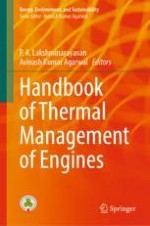2022 | OriginalPaper | Chapter
2. Thermal Management of Exhaust Aftertreatment for Diesel Engines
Authors : Achuth Munnannur, Nathan Ottinger, Z. Gerald Liu
Published in: Handbook of Thermal Management of Engines
Publisher: Springer Singapore
Activate our intelligent search to find suitable subject content or patents.
Select sections of text to find matching patents with Artificial Intelligence. powered by
Select sections of text to find additional relevant content using AI-assisted search. powered by
Abstract
-
Engine-based Thermal Management
-
Aftertreatment Fuel Introduction
-
Heat Generation
-
Aftertreatment Heat Retention
-
Exhaust Heat Management.
